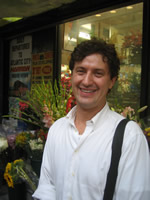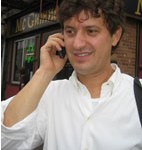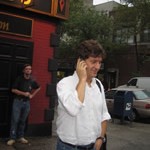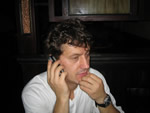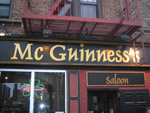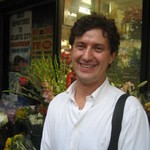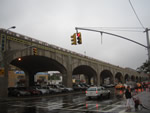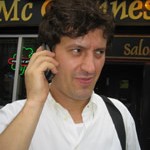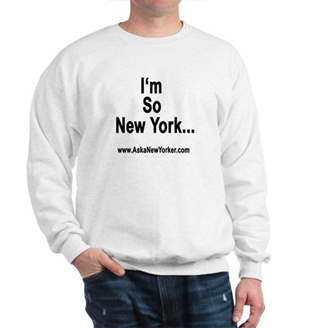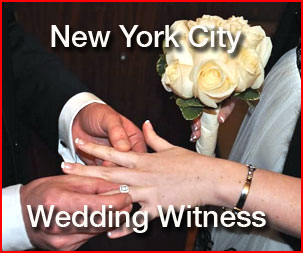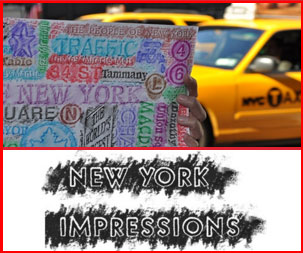Ask a New Yorker: hi Laszlo, where are you from originally?
Laszlo: Originally I was born in Hungary.
Ask a New Yorker: How long have you been in New York?
Laszlo: 23 years
Ask a New Yorker: So that would place you back in Hungary during the communist
era. How the hell did you get out?
Laszlo: Well it wasn’t easy to get out (laughter). Those days, to fly
out from behind the iron curtain, you know, you needed a little trick and the
finesse to trick the authorities to get your exit visa, because in those days,
you needed an exit visa to leave the block. We used to have two passports, the
red and the blue. The blue to the West and the red to the East. Matter of fact,
even my red passport was revoked, because if you wanted to go through either
Yugoslavia. In those days Yugoslavia was half and half. Half Communist half
West. Even that they revoked. So I had to get that back first in order to even
apply for the blue. I went into the authorities and kind of established a good
friendship with one of them, with one of the officials there who was a counter
intelligence officer. So we became kind of friends and he helped me get the
red passport back. In the meantime I moved from my small town to Budapest doing
some theatre work which gave me the opportunity to express myself and show myself
to the public, when I became, like, the next “hopeful”. So that
kind of helped assure the authorities enough to give me a pass to the West.
They thought I would definitely come back because I have a career waiting for
me. I ended up with a beautiful villa in Budapest in the Hill of the Roses.
Circumstantially, I became the prime lease holder. A beautiful villa built in
the 30’s.
Ask a New Yorker: O.k., so you left Budapest and where did you go to?
Laszlo: Yea, I went to Rome with Grandma. We convinced the authorities to go
to Italy and I accompanied grandma to Holy Rome which was a holy lie because
we did not care that much about Rome but just wanted to get out of the country.
So we ended up in Rome, where I stayed in a convent, where grandma had a contact
and where there were all these Christian orders in exile in Rome who had been
kicked out by the communists. They helped me put my trust into Rome, where I
asked for political asylum. Of course my end game was to get to the U.S. In
Rome, I stayed in this old Hungarian noble’s house so that I would not
have to stay in the refugee camps, where all the people in transit had to stay.
That was the procedure. I stayed in Rome where I encountered numerous notorious
people like Felinni and the Head of State of the Vatican. So this all happened
because of Grandma. She was a very social person.
Ask a New Yorker: Rome was great. But what happened next?
Laszlo: I wanted to come to New York. When you’ve never been here and
are looking at it from afar, I’d say it seems like utopia. New York is
a place where all humanity is boiling in a pot together. It has this magnetic
feeling to it. You want to belong. You want to be a part of it.
Ask A New Yorker: What was your first job?
Laszlo: Classic. What could be more classic then washing dishes at The Oyster
Bar? It was like a factory. We had thousands of dirty dishes. So after the dirty
dishes I lost like 50 pounds because of the chemicals we used; I threw up every
day. I went down to like 120 pounds. When I sent pictures back to Europe my
mother thought that was the AIDS crises. 1984. I’d say. “No, no
mother I’m washing dishes with some dangerous chemicals from New Jersey”
Ask a New Yorker: How did you learn English so well?
Laszlo: Of all the money that I made, and I didn’t make that much, it
all went to Columbia University’s super intensive course to get the Toefl,
which is a test for foreigners to learn English. So I did this for several months,
5-6 hours a day. So I just nailed it down, because wherever you go you have
to speak the language.
Ask a New Yorker: So how did Budapest get its name?
Laszlo: Well, first it was Buda. I suppose the tribes, the Madjars, called
it that when they settled down. The Madjars were refugees in Tibet. There’s
a lot of controversy around the city’s history. So when they found the
curve of the Danube they settled down there. They called it Buda as a holy place,
because it is. The entire town is supplied with mineral water. So basically
you’re flushing your toilet with spring water. What a splendor! Who could
afford that? Pest was the opposite side of the Danube, and Pest came from the
Black Plague. They placed the people in Pest in quarantine, the people who were
infected. The city was not unified until the 19th century. So for most of the
city’s history, it was called Buda.
Ask a New Yorker: Excellent. Great talking to you Laszlo and thank you for
sharing such an interesting story.






